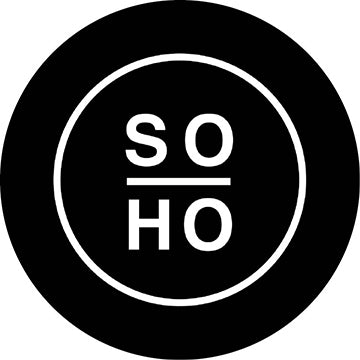Our Milk Blend Coffees
Soho's two primary milk blends, Dark Horse and Downtown Dandy, are our staple blends which deliver consistently from season to season. We collaborate with our green bean suppliers to select coffees from the same countries of origin and the same processing methods to achieve a similar flavour profile.
Here, we list which coffees are currently being used for your favourite milk blends, so you can stay up-to-date with where your coffee is coming from.
Last updated: 06.02.24
Colombia - Popayan Reserve
Popayan is located in the department of Cauca at 1.700 m.a.s.l. The regions topography is perfect to grow exceptional coffee!
The so-called Meseta de Popayan is sheltered by the Andes mountain range which helps generate homogeneous climatic and altitudinal characteristics. The result is a balanced cup profile with floral and caramel notes. Our friends at Cofinet collaborate with approximately 65 growers who contribute to this program and with whom they build long-term relationships. This program also encourages farmers to focus on quality and based on quality assessment Cofinet provide up to 20% premiums above the market price.
Municipality: Cauca
Classification: Reserve Program
Processing: Washed
Altitude: 1500-2070 masl
Botanical Cultivars: Castillo, Catimor Typica, Caturra
Location: Cauca, Popayan
Soil Characteristics: Volcanic Ash
Temperature: 19 degrees Celsius
Annual Rainfall: 1700-2000mm
Flavour Profile: Balanced acidity, with notes of chocolate milk and caramel

Ethiopia - Chebi Nensebo
Farmers cultivate coffee at the impressive heights of 1,900 to 2,100 meters above sea level. These high altitudes create the ideal microclimate for cultivating sweet, dense cherry.
Established in 2022, the Abebe Mulugeta producer group at Abebe Mulugeta Nensebo Chebi station is comprised of 250 smallholder producers in Chebi, Sidamo. Farmers cultivate coffee at the impressive heights of 1,900 to 2,100 meters above sea level. These high altitudes create the ideal microclimate for cultivating sweet, dense cherry. Their farms are small, about 1.5 hectares on average, which enables them to invest time and energy into high-quality cultivation. Most farms in Sidamo are organic-by-default and most farm work is done by the family.
Farmers and their families selectively handpick ripe, red cherry and deliver it to Abebe Mulugeta Nensebo Chebi station. At intake, cherry is selectively hand sorted to ensure only ripe cherry is processed. Accepted cherry is laid on raised beds to dry. Workers rake cherry frequently to ensure even drying and visually hand sort drying cherry to remove any damaged or underripes. It takes approximately 12 to 17 days for cherry to dry.
While Ethiopia is famous as coffee’s birthplace, today it remains a specialty coffee industry darling for its incredible variety of flavours. While full traceability has been difficult in recent history, new regulations have made direct purchasing possible. Our friends at Sucafina are partnering directly with farmers to help them produce top quality specialty lots that are now completely traceable, adding value for farmers and roasters, alike.
The exceptional quality of Ethiopian coffee is due to a combination of factors. The genetic diversity of coffee varieties means that we find a diversity of flavour, even between (or within) farms with similar growing conditions and processing. In addition to varieties, processing methods also contribute to end quality. The final key ingredients for excellent coffee in Ethiopia are the producing traditions that have created the genetic diversity, processing infrastructure and great coffee we enjoy today.
Most producers in Ethiopia are smallholders, and the majority continue to cultivate coffee using traditional methods. As a result, most coffee is grown with no chemical fertilizer or pesticide use. Coffee is almost entirely cultivated, harvested and dried using manual systems.
Station: Abebe Mulugeta Nensebo Chebe Station
Varietals: JARC varieties, Local Landraces
Processing: Natural
Altitude: 1900-2100 masl
Owners: 250 members of Abebe Mulugeta producer group
Subregion: Chebi, Nensebo
Region: Sidamo
Average Farm Size: 1.5 hectares
Flavour Profile: Densely sweet, balanced acidity, chocolate undertones

Brazil - Uyara Signature
Apart from their single estate coffees, our friends at Southland Coffee Merchants offer a wide range of speciality coffee throughout the entire year. Their Signature coffees, named in the Tupi-Guarani language, maintain a consistent flavour profile through swapping and combining different crops, predominantly sourced from medium and small growers within one region. Rather than working with one individual farmer, they collaborate with several growers in the same region to create the right balance and consistency. Their signature coffees are an excellent option to offer consistency throughout the entire year.
With an area of 2.4 million hectares to grow coffee and many different altitudes and climates plus the use of different processing methods, Brazil produces more than 50 million bags (60kg) with an incredible number of varieties of Arabica and Robusta coffees. The region where the founders of Southland Merchants are from and the quality department is based at is responsible for more than 50% of the national coffee production.
Uyará, one of Southland's Signature Coffees, delivers a very sweet coffee, in natural process, from Cerrado Mineiro. It exemplifies the consistent quality created by Brazil's coffee growers and offers the same profile throughout all seasons, despite changing environmental conditions.
Region: Cerrado Mineiro
Farmers: Regional Small Growers
Altitude: 1000 masl
Varietals: Catuai, Yellow Bourbon
Process: Natural
Flavour Profile: Caramel, vanilla, milk choc, very sweet, medium body, rounded acidity


